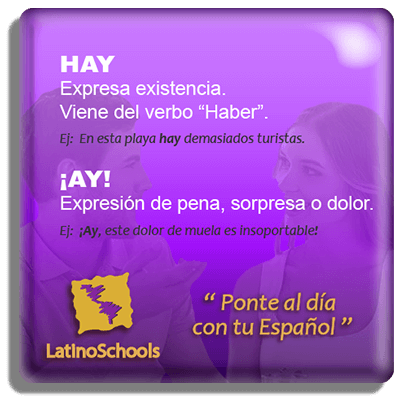Menu
Hay y ¡Ay!
(There is/are and Ouch!/Oh!/Ow!)

Hay
(Del verbo “haber”)
Expresa existencia.
Ej.: En esta playa hay demasiados turistas.
¡Ay!
Expresión de pena, sorpresa o dolor.
Ej.: ¡Ay, este dolor de muela es insorpotable!
There is/are
(From the verb “haber”)
It expresses existence.
Ex.: There are too many tourists on this beach.
Ouch!/Oh!/Ow!
Expression of pity, surprise or pain.
Ex.: Oh, this toothache is unbearable!
“Hay” and “¡Ay!” are two words which are difficult to differentiate for not only those who are learning Spanish but also for native Spanish speakers. As both words share the same sound but are written differently and have different meanings, it is important to know when and how each one of them is used.
With this Spanish pill, Latino Schools wants to give you some tips and practical examples of the use of these words in Spanish so that you learn how to differentiate between the two and use them according to the rules of the Spanish language.
Let’s start with “Hay”! This word is the impersonal form of the verb “haber” (there is/are) which is used to express that something exists or that somebody has something, to express that something is happening or in order to highlight an obligation which the subject of the sentence has (it is necessary/convenient, etc).
“¡Ay!”, on the other hand, is an interjection. It is an expression which expresses impressions or feelings such as pain, pity or surprise and it is usually written between exclamation signs (“¡!”, in Spanish we use two, one that opens (¡), and a closing one, upside down (!)).
These easy sentences provided as mnemonic devices will help you assimilate these rules: “Hay un niño que dice ¡ay!”(There is a kid saying “Ouch!”), “Una señora se ha dado un golpe y ha gritado ¡ay qué dolor!”(A woman has bumped into something and screamed: “oh, that hurts!”). If you want more examples, we have prepared more sentences for you to learn how to use “Hay” and “¡Ay!”.
Hay helados para todos en el congelador.
There’s ice cream for everyone in the freezer.
¡Ay, qué pena! La pérdida de mi perrita me ha dejado muy triste.
Oh, what a shame! Losing my little dog has left me very sad.
¿Qué hay de cenar, mamá?
What’s for dinner, Mom?
¡Ay! Cuidado con la comida que está en el fuego y se puede quemar.
Ow! Watch out for the food that’s on the fire and can burn.
Antes de ir a la playa hay que ir a comprar un paraguas.
Before going to the beach you have to go shopping for swimsuits.
¡Ay Dios mío! Casi se me olvida que hoy tenía cita en el médico.
Oh, my God! I almost forgot I had a doctor’s appointment today.
Mañana hay que madrugar para ir al trabajo.
Tomorrow we have to get up early to go to work.
¡Ay! Me he pinchado con la aguja.
Ouch! I’ve pricked myself with the needle.
Me gustaría ir a ver la película si todavía hay entradas.
I’d like to go see the movie if there are still tickets.
¡Ay, no! Me he equivocado al mandar el mensaje.
Oh, no! I sent the wrong message.







